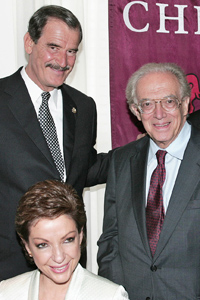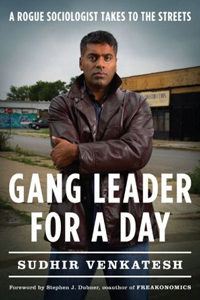Chicago in the News
The Chronicle’s biweekly column Chicago In the News offers a digest of commentary and quotations by a few of the University faculty members, students and alumni who have been headlining the news in recent weeks. Chicago faculty members are some of the most frequently quoted experts, so space allows publishing references to only selected examples. To read many of the full newspaper articles mentioned in this column, visit the In the News column at the University News Office Web site: http://www-news.uchicago.edu.
 Friedrich Katz (far right) poses with former President of Mexico Vicente Fox and his wife, Marta Sahagùn, during their 2004 visit for the naming of the University’s Mexican Studies Center. The center was named after Katz, an expert on Mexican history. |
|
Joining the political process
An article featuring Friedrich Katz, the Morton D. Hull Distinguished Service Professor in History and the College, was published in the Tuesday, Jan. 15 Chicago Sun-Times. The article reported on Katz’s recent U.S. citizenship, which he said was prompted by his opposition to the war in Iraq. Katz, whose family was granted asylum in Mexico when they fled Europe during the Nazis’ rise to power in the 1930s, is a leading scholar on Mexican history. Katz’s long-standing legal residency in the United States and his ties to Mexico have strengthened his stance on immigration. U.S. policy toward undocumented immigrants has been a subject of the presidential primary debates and has further encouraged him to participate in the American political process. “I decided, it’s time,” said Katz. “It’s my responsibility right now to participate. I don’t think the people who say they want to send them back have thought through the consequences. What would happen to the country? It would create economic and political chaos. From the point of security, it would be a nightmare for the U.S.,” he said. “Don’t they realize what it means to the security of the U.S. if the country on our southern border is destabilized?”
Recycling those misplaced ‘ofs’
Jason Merchant, Associate Professor and Director of Undergraduate Studies in Linguistics, was quoted in William Safire’s column in the Sunday, Jan. 13 issue of The New York Times. Writing about the increasingly common—and incorrect—usage of the word “of,” especially when substituted for the word “have,” Safire made his case and referenced the work of Merchant. Safire quipped that the bad “ofs” that are deleted from writing could be recycled to find their way back into sentences where they belong, such as following the word “couple.” Safire asks: “Why has the of been decoupled from couple?” The linguistics professor Jason Merchant at the University of Chicago, wrote Safire, has a theory of constrained reduction: “a couple of can mean ‘two,’ but it can also be true of small groups larger than two.” Example 1: “A couple of friends came over last night.” 2. “A couplea friends came over …” 3. “A couple friends came over …” The professor finds that last comparable to “a few friends.” The couple of in the second example merges into couplea (which I would spell coupluh). As I get it, the of dribbles down to a schwa (uh) and then to nothing. Presto – “a couple friends.”
Show me the alpha
Raghuram Rajan, the Eric J. Gleacher Distinguished Service Professor of Finance in the Graduate School of Business, wrote an op-ed that appeared in the Wednesday, Jan. 9 Financial Times. Rajan argued that compensation practices in the financial sector are flawed. He noted that shareholders are unlikely to pay an asset manager much for returns based on beta risk, the systematic risks the manager takes, rather than the manager’s alpha, the value his abilities contribute to the investment process. “Such abilities are rare,” wrote Rajan. “How then can untalented investment managers justify their pay? Unfortunately, all too often it is by creating fake alpha – appearing to create excess returns but in fact taking on hidden tail risks, which produce a steady positive return most of the time as compensation for a rare, very negative return.”
Endangered languages
An article in the Monday, Jan. 7 Chicago Tribune, reporting on endangered languages, featured the work of University linguists John Goldsmith, the Edward Carson Waller Distinguished Service Professor in Linguistics, Computer Science and the Physical Sciences Collegiate Division, who is working on a Web-based project to preserve recordings of Mayan language that were made in the 1930s in Guatemala and Mexico; Erin Debenport, a linguistics graduate student who is working in New Mexico to preserve the southern Tiwa language at Sandia Pueblo; and Alan Yu, Assistant Professor in Linguistics, who is using a grant to document the Washo language in Northern California. The article notes that the National Endowment for the Humanities and the National Science Foundation fund Goldsmith’s project, which is expected to debut online this year.
Educational investment
Eric Posner, the Kirkland & Ellis Professor in the Law School, was quoted in a Monday, Jan. 14 story that appeared in the Chicago Tribune. The story reported how the traditional, not-for-profit school is becoming a for-profit business. A growing interest in profitable educational ventures, such as those being developed in Chicago, are successfully gaining financial support from investors because of their built-in socially conscious incentive. “There are good marketing and advertising reasons for business to give money to universities,” said Posner, noting that corporate contributions that support these ventures often can be formed as sponsorships.
Spreading the word
Ted O’Neill, Dean of College Admissions, was interviewed for articles that appeared in The New York Times, the Chicago Tribune and the Chicago Sun-Times, which reported an increase in college applications at Midwest universities. “It’s striking. I think basically just more people know about the University of Chicago, partly through our own efforts and partly through word of mouth,” said O’Neill in the Tuesday, Jan. 15 Chicago Sun-Times.
They should know better
Edward Laumann, the George Herbert Mead Distinguished Service Professor in Sociology and the College, was quoted in a Tuesday, Jan. 15 article published in the Chicago Tribune that reported aging baby boomers and seniors are at risk for HIV. Laumann co-authored a study released last August on the sexual attitudes and practices of adults 57 and older—based on data from the University’s National Social Life, Health and Aging Project. He noted in the Tribune that older adults should know better than to have unprotected intercourse because they were young enough to have been exposed to extensive public education efforts about AIDS/HIV when the epidemic began. “Educating them isn’t going to affect anything,” he said, “and it’s a waste of money, particularly when there are other vulnerable groups that need the resources anyway.”
 | |
‘Gang leader for a day’
The research of alumnus Sudhir Venkatesh (A.M.,’92, Ph.D.,’97) which is described in his recently released book, Gang Leader for a Day, A Rogue Sociologist Takes to the Streets, was the subject of articles recently published in Time Out Chicago, the Wednesday, Jan. 16 New York Times and the Thursday, Jan. 10 issue of the Chicago Sun-Times. Taking an ethnographer’s approach in his sociological study, Venkatesh embedded himself in the former Robert Taylor Homes at the height of crack cocaine sales in Chicago during the 1980s. He won the trust of a gang leader, named J.T., who confided in Venkatesh about his drug business and about his life in that violent world. “I’m interested in how people try to be moral and just and do the right thing in the context of being very poor, and having to make tough decisions,” said Venkatesh. “I was interested in the moral questions of what people do to survive.”
![[Chronicle]](/images/sidebar_header_oct06.gif)